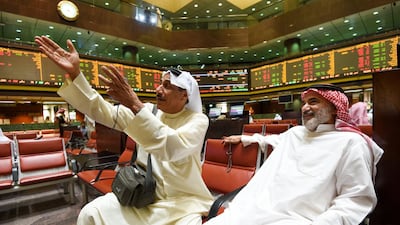The Kuwait stock exchange embarked Sunday on the second phase of a revamp, a move that coincides with the upgrade of the country's equities to emerging market status by the index compiler FTSE Russell.
As part of the reorganisation, the stock exchange from Sunday divides the stocks listed on the bourse into first, main and auction, depending on the market capitalisation and liquidity. The changes the exchange is undertaking come amid efforts to make it more attractive to foreign investors as the oil rich state seeks to lessen its reliance on hydrocarbon revenues.
“Premier Market forms the elite segment within Boursa Kuwait,” according to the stock exchange. “It will be occupied by high calibre companies with high liquidity and medium to large market capitalisations.”
________________
Read More:
Boursa Kuwait preparing for its IPO in first quarter of next year
NBK says 2017 profit rises 9.2 per cent, beating analyst expectations
________________
The 16 companies in the premier market index include the National Bank of Kuwait, the country's biggest lender by market value, and telecoms operator Mobile Telecommunications Company, also known as Zain, the largest publicly traded telecoms firm in the Gulf state.
These companies, like those in the other two segments, will be assessed on an annual basis based on performance and trading to see if they maintain their place or move up or down. Companies in the premier market are required to hold quarterly analyst meetings and submit disclosures in both Arabic and English. Premier listed firms must also have a market capitalization of at least 144 million dinars and an average daily trading volume of 90,000 dinars, according to Bloomberg News, who cited the Kuwaiti stock exchange.
No one at the Kuwaiti stock exchange was available to comment by phone and the bourse didn’t reply to an e-mail seeking comment before the newspaper went to print.
FTSE Russell upgraded Kuwaiti stocks to emerging market status in September and analysts said the move may attract more than $800 million, based on the 0.4 per cent weighting it will have in the index. Kuwait's inclusion into the index will happen in two equal stages this year in September and December.
The country however is not universally acknowledged as an emerging market. The MSCI Emerging Market Index, the oldest developing world equities benchmark, still classifies Kuwait as a Frontier Market.
Boursa Kuwait, which is among the region’s oldest equity markets, expects IPO activity to pick up pace in the $90 billion market in the next few quarters. Boursa Kuwait chief executive Khaled AbdulRazzaq AlKhaled said in March that he was expecting up to three initial public offerings this year.
The Kuwait stock exchange itself is preparing for its own initial public offering in the first quarter of 2019 amid a pick-up in equity capital market deals and efforts of the regional government to privatise some state-controlled assets.
Kuwait’s market regulator, the Capital Markets Authority (CMA), in mid-February appointed a consortium of advisers to help it to sell a stake in the state’s stock exchange, joining a growing list of Arabian Gulf countries looking to privatise their equity markets.
The CMA picked up Tri International Consulting Group to advise on selling a minimum of 26 per cent and a maximum of 44 per cent of Boursa Kuwait to an international exchange operator.

